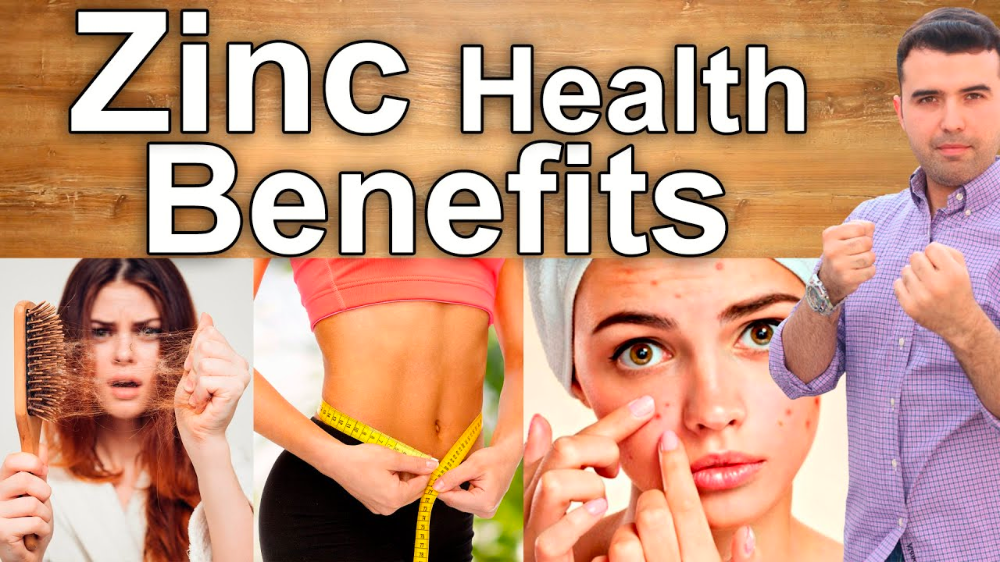The amazing health benefits of zinc are, Zinc is a mineral found in many different rocks and soils. It is a soft, white, lustrous metal that can be easily cut, shaped, and polished. Zinc is very important for human health because it is a component of many enzymes and proteins. Zinc also helps to make skin, hair, and nails strong and healthy.
Zinc is an essential mineral that is needed for overall wellness. It is important for the body to have enough zinc for the proper function of the immune system, reproductive system, skin, hair, and nails. Zinc is also necessary for cognitive function and for preventing diseases. Zinc is a mineral that is essential for human health.

It is a component of over 30 enzymes and is involved in many important processes in the body, including DNA synthesis and protein synthesis. Zinc is especially important for the immune system, as it helps to fight infections. It is also important for the production of hormones, including testosterone. Zinc also helps to keep the skin healthy and helps to prevent hair loss.
There are many health benefits to taking zinc supplements, and it is a good mineral to include in your diet. If you are looking for a mineral that has many health benefits, zinc should be at the top of your list.
What are The Amazing Health Benefits of Zinc?
Zinc is an essential mineral that is found in many foods. It is important for our health because it helps to protect our cells from damage and helps to make proteins and other important molecules. Zinc also helps to keep our blood vessels open and functioning properly.
Essential Role of Zinc in Our Body
- Zinc is an essential mineral for human health. It is involved in many important body processes, including growth and development, reproduction, nerve function, and immune system function.
- Zinc is essential for the body’s ability to create new cells. It is also important for the body’s ability to repair damaged cells. Zinc is also important for the production of hormones, including testosterone.
- Zinc is important for the body’s ability to resist infection. It is also important for the body’s ability to fight against cancer. Zinc is also important for the body’s ability to digest food.
- The recommended daily intake of zinc is 11 to 13 mg. The body can usually get enough zinc from food. However, people who are pregnant or who are breastfeeding should take more zinc.
Boosts Immune System
Zinc is a mineral that is essential for the body’s immune system. A lack of zinc can lead to a weakened immune system, making you more susceptible to infections and disease. The recommended daily intake of zinc is 11 to 13 milligrams. However, the recommended daily intake for adults aged 19 to 50 is 11 to 13 grams. Zinc can be found in many foods, including meat, poultry, fish, legumes, nuts, and seeds.
Supports Cellular Growth and Repair
Zinc is an essential mineral that supports cellular growth and repair. It is important for the body to have enough zinc to function properly, as zinc can help to protect cells from damage and promote the growth of new cells. Zinc can also help to regulate the activity of other hormones and proteins in the body.
Supports Reproductive Health
Zinc is an essential mineral for reproductive health, playing an important role in supporting a healthy immune system, and reproductive tissues, and regulating testosterone levels. Studies have shown that adequate levels of zinc can help to improve fertility and overall reproductive health.
Promotes Wound Healing
Zinc is an essential mineral that is necessary for the body to function properly. Zinc is involved in a variety of processes in the body, including wound healing. Zinc is a key player in the synthesis of new tissue and the repair of the existing tissue.
Zinc is a key mineral for wound healing because it helps to promote the growth of new collagen and new blood vessels. Zinc also helps to eliminate toxins and promote the healing process.
Supports Normal Taste and Smell
Zinc is an essential mineral for the normal functioning of taste and smell. It plays a crucial role in the formation of taste buds and helps to detect chemicals through smell. Additionally, zinc helps to maintain a strong immune system, allowing the body to defend itself against illnesses.
Unlocking the Power of Zinc to Support Overall Wellness
Zinc is a mineral that is essential for overall health and well-being. It is a key component of over 300 enzymes and is involved in the production of proteins, DNA, and other molecules. Zinc deficiency can lead to a number of health problems, including an increased risk of cancer, a decrease in immune system function, and difficulty concentrating.
There are many ways to get zinc into your diet. Some good sources include meat, poultry, fish, legumes, nuts, and seeds. Zinc can also be found in fortified foods and supplements. If you are deficient in zinc, it is important to get started on a supplementation program as soon as possible. There are many zinc supplements available on the market, so it is important to find one that is appropriate for your needs and lifestyle.
Supports T-cell Function
It is involved in many processes in the body, including supporting the function of the immune system. Zinc is especially important for the development and function of T-cells. And necessary for the production of white blood cells, which help the body fight off infections. Zinc also helps to protect the cells from damage and helps to create antibodies. Zinc is also important for the growth and function of the immune system.
Protects against infections
Zinc is an essential mineral for human health, playing an important role in many enzymes and proteins. It helps to protect the body against infections and is vital for the growth and development of cells. Adequate levels of zinc in the body are essential for optimal health.
Supports Antioxidant Activity
Zinc is an essential mineral that supports the antioxidant activity. It helps to protect cells from damage caused by the free radicals that are produced during normal metabolism. Zinc also helps to increase the production of enzymes that protect cells from damage. In addition, zinc helps to promote the growth of new cells.
Supports Cellular Growth and Repair
Zinc is an essential mineral that supports cellular growth and repair. It is also important for the production of enzymes and hormones. Zinc is found in meat, grains, legumes, nuts, and seeds. It is also found in some fortified foods.
Essential for DNA Synthesis
Zinc is an essential mineral for DNA synthesis. Zinc is needed for the production of enzymes and proteins, and it is also necessary for the synthesis of DNA. Zinc is found in many foods, including meat, poultry, fish, legumes, and grains.
Supports Tissue Repair
Zinc is an essential mineral for tissue repair and healing. It aids in the formation of new cells, which helps to repair damaged tissues and heal injuries. Additionally, zinc plays an important role in the immune system, helping to protect the body from infection and disease.
Supports Healthy Skin
Zinc is an essential mineral for healthy skin. It helps to maintain the integrity of the skin’s barrier and to prevent inflammation. It is also important for the production of collagen, a key protein that helps to keep the skin elastic. Zinc also helps to fight skin cancer.
Supports Reproductive Health
Zinc plays an essential role in reproductive health. It helps maintain healthy sperm and prevent birth defects by promoting a healthy uterus. In addition, adequate levels of zinc can help to ensure a healthy baby by helping to regulate hormone levels and promoting proper fetal development.
Essential for Sperm Production
Zinc is an essential mineral for healthy sperm production. A deficiency in zinc can result in a decrease in sperm count and motility, which can ultimately affect fertility. To ensure adequate zinc intake, it is important to consume foods such as oysters, poultry, nuts, legumes, and whole grains, which are all rich in zinc.
Supports Ovarian Function
Zinc is a mineral that is essential for ovarian function. It is important for the production of hormones, including estrogen and progesterone. Zinc also helps to keep the ovaries healthy and functioning. The development of new technologies has revolutionized the way we live our lives. From the introduction of the internet to the development of artificial intelligence, our lives have been drastically changed for the better. We now have access to information and services that were once impossible to obtain. Additionally, we can communicate with anyone, anywhere in the world, with just a few clicks of a button. The development of new technologies has made our lives easier, faster, and more efficient.
Supports Pregnancy and Fetal Development
Zinc is essential for a healthy pregnancy and fetal development. Zinc is important for the immune system, blood sugar control, and DNA synthesis. Zinc is also needed for the development of the central nervous system. Zinc deficiency during pregnancy can lead to birth defects of the brain and spine.
Zinc Supports Collagen Formation
Zinc is a mineral that is essential for the formation of collagen, a protein that is essential for the structure and function of skin, hair, nails, and other tissues. Zinc is also important for the production of energy in the body.
Good Food Sources of Zinc
Oysters
Zinc is a mineral that is important for the body’s overall health. It is involved in many important processes in the body, including cell growth and reproduction, immune system function, and energy production. Oysters are a good source of zinc because they contain high levels of the mineral in their flesh.
Beef
A 3-ounce serving of beef contains an impressive 20 milligrams of zinc, an essential mineral for growth and development, and for the proper functioning of enzymes and proteins. Zinc is essential for a healthy body and plays a critical role in many bodily processes. A 3-ounce serving of beef provides a whopping 20 milligrams of zinc, a mineral essential for the body’s growth and development, as well as for the proper functioning of enzymes and proteins. This powerful mineral also helps to strengthen the immune system and support healthy skin.
Pork
Pork is a good food source of zinc. A 3-ounce serving of pork contains about 20% of the recommended daily allowance of zinc. Zinc is important for preventing zinc deficiency and promoting good health. It is also essential for wound healing, bone growth, and cognitive function.
Chicken
Chicken is a great source of zinc, providing approximately 20 milligrams of the mineral in just a 3-ounce chicken breast. This amount is more than enough to meet the daily recommended intake of zinc and can help prevent zinc deficiency.
Beans
Beans are a good food source of zinc. Zinc is essential for human health and plays a role in many body functions. A lack of zinc can lead to a decrease in the immune system and an increased risk of infections. Beans are a good source of both soluble and insoluble zinc. Soluble zinc is found in the beans’ hull and can be easily absorbed by the body. Insoluble zinc is found in the beans’ skin and is not as easily absorbed. Beans are a good source of both types of zinc.
Nuts and Seeds
Nuts and seeds are a great source of zinc, an essential nutrient for a strong and healthy immune system. Zinc helps to prevent diseases and is important for growth and development in children. It also plays an important role in the health of adults, including maintaining healthy skin, vision, and reproduction.
Tips to Ensure Adequate Zinc Intake
There are a few ways to ensure that you are getting an adequate amount of zinc in your diet. One way to ensure adequate zinc intake is to include zinc-rich foods in your diet. Some good sources of zinc include oysters, beef, poultry, legumes, nuts, and seeds. Another way to ensure adequate zinc intake is to take a zinc supplement. A zinc supplement can be found at most health food stores. Also, check this best supplement for an All-Day Energy Boost!
Incorporate Zinc-rich Foods into Your Diet
Zinc is an essential mineral that is important for overall health. It is involved in a variety of important body functions, including growth and development, wound healing, and immune system function. In addition, zinc helps to maintain a healthy weight and keep your skin healthy.
To get the most benefit from zinc, it is important to incorporate it into your diet. Some good sources of zinc include oysters, beef, poultry, legumes, and nuts. Try to eat at least 10-15 grams of zinc per day. Some good ways to include zinc-rich foods in your diet include:
-Having oysters as a main course at dinner
-Adding legumes, such as lentils or chickpeas, to your lunch
-Eating a roasted beef or chicken dinner
-Snacking on nuts
Consider Taking a Zinc Supplement
Zinc is a mineral that is essential for human health. It is involved in many body processes, including immune system function, wound healing, and cell growth and division. Zinc is also important for maintaining a healthy skin tone.
Zinc can be found in many foods, but it is especially concentrated in meat, poultry, seafood, legumes, nuts, and seeds. The recommended daily intake of zinc is 11-13 mg. However, most people consume less than the recommended amount.
Zinc supplements are available over the counter and are often recommended for people who are not getting enough zinc from their diet. Some people also take zinc supplements to treat conditions such as zinc deficiency, acne, and psoriasis.
Avoid High-Phytate Foods
If you’re looking to ensure adequate zinc intake, avoid high-phytate foods. These foods contain high levels of phytates that can bind to zinc, thus inhibiting its absorption. To ensure adequate zinc intake, try to stick to low-phytate sources such as legumes, nuts, and seeds. These foods contain much lower levels of phytates, allowing for better zinc absorption.
Conclusion
Zinc is an essential trace mineral that plays an important role in overall health and wellness. It is essential for a healthy immune system, helps repair and heal wounds, helps the body manufacture proteins, and helps with the absorption of other essential vitamins and minerals. Zinc is also an important mineral for healthy skin, hair, brain, and eye health.
With so many amazing benefits, it’s no wonder why zinc is often referred to as a miracle nutrient. Incorporating more zinc-rich foods, such as oysters, beef, pumpkin seeds, and chickpeas into your diet, is essential to unlocking the power of zinc and supporting your overall wellness. With its many benefits, it makes sense to include more of this essential trace mineral in your diet and lifestyle. If you find these blogs helpful, please share this with your loved ones and friends. You are also welcome to visit our other related blog for more tips and recommendations.



